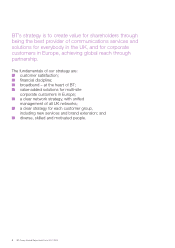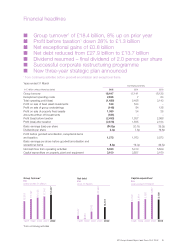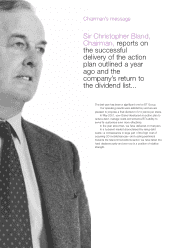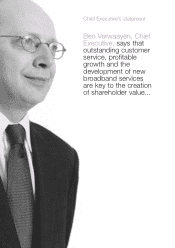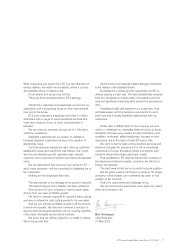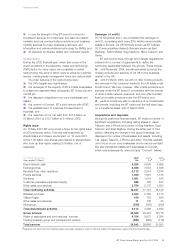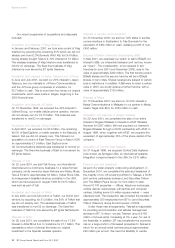BT 2002 Annual Report Download - page 13
Download and view the complete annual report
Please find page 13 of the 2002 BT annual report below. You can navigate through the pages in the report by either clicking on the pages listed below, or by using the keyword search tool below to find specific information within the annual report.
Business review
12 BT Group Annual Report and Form 20-F 2002
Exchange line turnover, comprising rental and connection
charges, accounted for approximately 30% of our revenues
in the 2002 ®nancial year. The number of BT Group's
business lines grew by 1.3% over the year, with high-speed
ISDN services being the main driver behind this growth.
Despite competition from other ®xed-line providers, the
number of residential lines increased marginally (by 0.3%),
reversing the previous declining trend, due to a combination
of customers installing second lines and customers
returning to us from other operators.
In a highly competitive market, BT Retail has developed
innovative pricing packages designed to meet the needs of
small, medium and major businesses and residential
customers.
During the 2002 ®nancial year, BT Retail further
developed its innovative BT Together pricing package,
which offers reduced rate calls and other bene®ts for a ®xed
monthly fee. To date, more than 10 million customers have
signed up for the package. The scheme was enhanced to
include the option of unmetered UK calls at evenings and
weekends. An option including unmetered off-peak internet
calls (SurfTime) was also made available. The UK calls
package offers more than 6,000 hours of unmetered
national calls per year for every BT customer. This new
addition to the BT Together family has so far attracted
610,000 customers.
As at 31 March 2002, 71% of residential customer call
minutes were made by BT Together package subscribers.
In the residential market, the successful rollout of
pricing packages contributed to stabilising our share of the
®xed-line voice market and improving customers'
perception of price and value for money.
In June 2001, BT Answer 1571, a free answering
service for all our residential customers, was launched. This
service, which takes messages if a person is out, engaged
on another call or sur®ng the internet, has proved highly
successful; more than ®ve million customers had signed up
for this service by 31 March 2002.
As well as adding to our call packages and range of
services, we listened to our customers and made it easier
for them to understand how their charges had been
calculated, by introducing a new and clearer bill. This had
the added advantage of being more environmentally friendly
than its predecessor, saving up to 730 tonnes of paper a
year.
New-wave business
Existing new-wave business, including ISDN lines, customer
premises equipment, digital private circuits and
conferencing, showed growth of 10%.
In December 2001, BT Retail announced a target of a
4% per annum increase in incremental revenue from
existing new-wave business by the 2005 ®nancial year.
In addition, it announced a plan to introduce a number
of new-wave initiatives to generate incremental revenue of
£825 million by the 2005 ®nancial year. These include:
&a stronger push into broadband products and services,
with the announcement in April 2002 of BT Broadband,
which redraws the way internet access is sold. BT
Broadband, which will be widely available from Autumn
2002, allows customers always-on, high-speed direct
access to the internet over a single home phone line. It
strips out services like e-mail, free personal web space and
content. This leaves customers free to create a portfolio of
services and content they want, and means that they do not
have to pay for services they may not need;
&an increased focus on mobile solutions, working with
mmO2 and other partners; and
&wireless local area network (LAN) solutions for
businesses and consumers.
In April 2002, BT Retail announced that it would be
launching a new portfolio of mobile services in June 2002.
This will mean a wide range of products for business
customers and the creation of a new service provider
business in the mobile market, giving uni®ed billing and
customer service for the ®rst time under the BT brand. As
part of BT Retail's mobility strategy, it was also announced
that we planned to build the UK's ®rst public access
wireless LAN network by installing around 400 `hotspots'
(access points in airports, stations, hotels, etc.) by June
2003. We estimate that there will be up to 4,000 sites by
June 2005 and we will be working closely with our partners
Motorola and Cisco to build the new network.
Other examples of this new-wave strategy include:
&a major initiative, e-payphones, was announced in
December 2001. This involves a partnership with Marconi to
launch the world's largest public network of multimedia
payphone terminals. We will install 28,000 of the new
Marconi-built terminals, which will offer full internet access,
e-mail and text messaging. Rollout started in April 2002,
with 3,000 terminals planned to be in place in the UK within
a year;
&during the 2002 ®nancial year, we connected up to
2,000 SMEs a week to broadband. An NOP Research
Group poll in February 2002 con®rmed BT as the number
one internet service provider for businesses with between
one and 49 employees. During the 2002 ®nancial year, we
connected a UK business to the internet every ®ve minutes,
on average; and
&our commitment to broadband for SMEs led to our
enthusiastic involvement in the ACT NOW programme in


